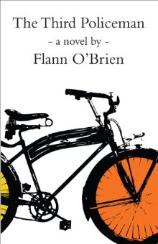O’Brien, Flann. (1967) The Third Policeman. Champaigne, Ill.: Dalkey Archive (209pp)
This strange tale is strongly reminiscent of Alice in Wonderland. An unnamed narrator in 19th century Ireland tells his first-person story of stumbling into another world where fantasy prevails over reason and physics. He finds himself in the company of two policemen who are obsessed with bicycles (and preventing their theft) and concerned above all with maintaining the correct operating environment of an underground lair called “eternity,” where anything one desires can be magically produced from a sequence of electro-mechanical storage boxes. The policemen take our hapless narrator down the hole and he requests gold and diamonds, which are duly produced for him. Alas, the rule is, nothing can be taken back up the elevator, so his riches are useless.
Back from eternity, a commissioner reports that a bicycle has been stolen and demands that something be done. The two policemen announce that the narrator is the thief and that they have already caught him. This satisfies the commissioner, but the narrator now must be hanged for his alleged crime. Fortunately he is saved in the nick of time by an army of one-legged men who tie themselves together in pairs, their good legs on the outside, so that they can run as well as any able-bodied man. And on and on. There is no actual plot. The mysterious third policeman does appear in the end, to no important consequence. The characters are loony-toons, so the enjoyment of the book arises from its wonderfully strange language and its delightful fabrications.
Some of my favorite examples of the latter include the explanation of why the earth must be shaped like a sausage. Most people believe there are four directions, north, south, east and west. But a demonstrable fact is that if you travel east for a long enough time, you end up back where you started. Therefore distinguishing east and west as separate directions is spurious, as only one of them is genuine. Similarly for north and south, leaving only two genuine directions. The explanation continues in similar shaggy logic until it is “proved” that the earth must be sausage-shaped.
Another favorite was a knife that could prick your skin and draw blood when it was several inches away from you. That’s because it had been sharpened to such a fine point that the last few inches of it were entirely invisible to the human eye.
Another riff exploits Zeno’s paradox to “explain” why movement through space is merely an hallucination, not really possible. Another explains that when light waves are stretched out longer and longer, they eventually become sound waves. The two policemen therefore spend the summer collecting sounds and putting them in a box, so that in the winter they can be compressed and turned back into much-needed light.
Some of the wonderful descriptions and dialogs include:
“We were in an entirely other field by this time and in the company of white-coloured brown-coloured cows. They watched us quietly as we made a path between them and changed their attitudes slowly as if to show us all of the maps on their fat sides. “
The high saddle was the father of the low handlebars. It crucifies the fork and gives you a blood rush in the head, it is very sore on the internal organs.’
‘Which of the organs?’ I inquired.
‘Both of them,’ said the Sergeant.”
“When are you going to hang me,” I asked…
“Tomorrow morning, if we have the scaffold up in time, and unless it is raining. You would not believe how slippery the rain can make a new scaffold. You could slip and break your neck…”
“A map!” I cried excitedly…
“You will agree, he said, that it is a fascinating pancake and a conundrum of great incontinence, a phenomenon of the first rarity.”
Is there any point to this romp through wit and language? Being generous, one could say there is an implicit moral through-line to the effect that if one is evil when alive, one will be eternally perplexed when dead. That’s not much of a thesis, so I’d say instead that the book has no deeper meaning than the words on the page, and one should just enjoy it as a playful compendium of tall tales.

